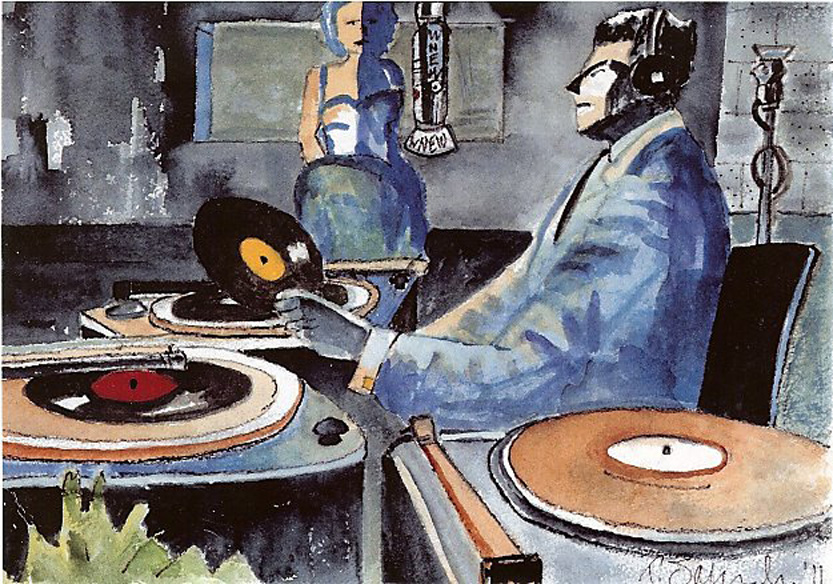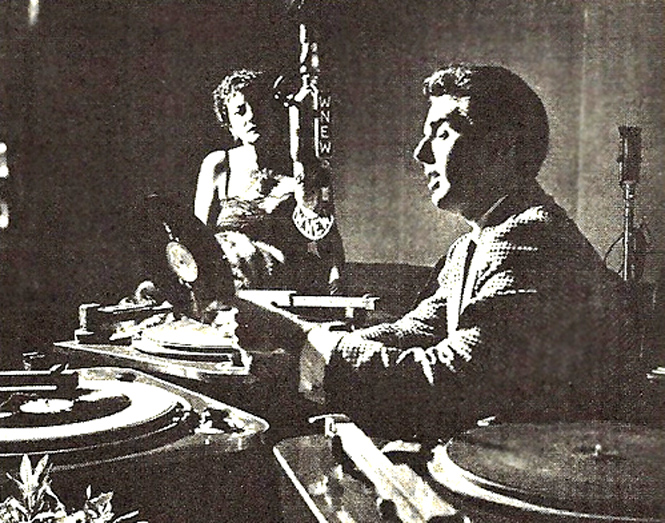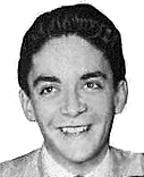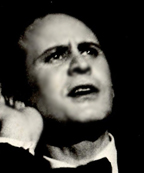Art Ford and the Night Visitor
The watercolor (above) by Tom Saunders is based on the photo (below) published in Arnie Passman’s book, “The Deejays,”* But, the woman in the painting is not the woman in the photo. Explanation, below.
As WNEW’s first Station Manager, Bernice Judis often dropped in on shows at any time of the day or night. In the photo above, she is seen during an after-midnight visit to “The Milkman’s Matinee” when it was hosted by Art Ford. (1942-1954) In an e-mail to long-time friend, and ‘NEW alum, ABC’s Bill Diehl, Saunders explained: “I read that Bernice Judis was the manager who fired Art Ford for playing too much ‘jazz and international’ music, so I purposely eliminated her and put in a blond groupie instead.” Saunders identified correctly the cause of Ford’s firing, but not his executioner. Judis retired from WNEW in 1954 after 20 years with the station, and about four years before Ford got word while in Europe in April, 1958, that his services were no longer desired.
Art Ford had hosted the “Make Believe Ballroom” for little more than a year, taking over from Jerry Marshall who left for WMGM in January, 1957. Ford’s affection for jazz, European artists and non-mainstream music had not been to management’s liking when featured on his previous show, “Ford at Four,” (1954-1957) and even earlier on “The Milkman’s Matinee. (1942-1954.) Al “Jazzbeaux” Collins, who followed Ford at the “Matinee” didn’t last long. After playing the Chordettes’ “Mr. Sandman,” 55 times in a row one early morn, he was asked to leave. When Jazzbeaux returned to WNEW about ten years later, “Mr. Sandman” was the first record he played. More on that episode, another day.
Soon after being fired, Ford said, “I am happiest when the garde is avant, and the garde at WNEW is no longer avant.” He found exactly the environment he was looking for at WNET radio and TV. (See “Art Ford’s Jazz Party.” Rudy Ruderman (WNEW 1953-1974).”) recalls that the General Manager at the time Ford was fired, was John Jaeger and the station president and part owner was the late Richard Buckley (see “Other Signals” this site) Before 1958 ended, WNEW had new owners.
Here’s the decade’s buy/sell sequence. In 1949, WNEW’s original owners, Milton Biow and Arde Bulova sold to Bernice Judis, her husband, Ira Herbert, and William S. Cherry, owner of WPRO, Providence, RI. They sold WNEW in 1954 to The Buckley Group which merged two years later with DuMont Broadcasting, a newly formed company that grew out of the failed Dumont Television Network. Dumont had sold off to shareholders, most of its TV and radio properties, including WABD-TV, NYC. In 1957, DuMont/Buckley changed its name to Metropolitan Broadcasting. The following year, Paramount Pictures, a major shareholder in DuMont/Buckley, sold its shares to investor John Kluge who soon gained a controlling interest. Within a year, WABD-TV was changed to WNEW-TV, and an FM license was acquired for WNEW-FM to simulcast the AM programming. John Kluge’s immediate acquisitions included WHK-AM/FM, Cleveland, and WIP-AM/FM, Philadelphia. Kluge’s company was renamed Metromedia, although Metropolitan Broadcasting remained in use for the Radio Division until 1967.
Although Bernice Judis was not involved in Ford’s firing, she had swung the ax on a young William B. Williams in 1947, and unsuccessfully at Ruderman in 1954. William B. had been with WNEW only a few years, coming over from WOV, when Judis spotted him during one of his shows, feet propped up on the console, shoes off, red socks brightly revealed. He was fired, the story goes, for having, “vulgar taste.” One newspaper account suggested the real reason for the firing was one the station dared not admit; that management was unhappy with Williams’ union activism. William B. returned to WNEW in 1954, at about the time Bernice Judis retired to manage stations with her husband, Ira Herbert, in Birmingham, Alabama and Atlanta, Georgia. It was Herbert who saved Rudy Ruderman from Judis’ wrath. As Rudy tells it:
“…I was bumped up (1954) from continuity writer and traffic reporter to producer which was an AFTRA job at the time, because we had to spin the records when the DJs were on tape; a unique dispensation from the engineers’ union to let the talent handle the discs in the studio. At other stations, IBEW people played the records from the control room. I was paid $85, a sum Bernice Judis gave up grudgingly. Upon my promotion I asked if I could first take the week’s vacation I had earned as a continuity writer. “Tudie” (which I think we called her) really blew her top, saying ‘You can take a really long vacation, kid, how dare you ask, you’re fired!’ Her husband, sales manager Ira Herbert, got her to relent saying, you can’t get blood from a stone, or something and I got the week off, as well as the job…”
As the Kluge years began, Ruderman was sent to Cleveland as PD of WHK, but he was back in New York a few months later, and in the WNEW newsroom, to cover a big story. New York’s newspapers were shut down by a strike by delivery drivers and pressmen (Dec. 11-28) He never returned to Cleveland.
Getting back to Tom Saunder’s e-mail to Bill Diehl:
“…Even in my early 20’s while still working back in Syracuse and Buffalo, I used to listen to WNEW attentively to steal lines from the jocks (although I was stuck doing Top 40 at the time.) My favorite then was the ill-fated Pete Myers, and I liked him best doing MOR, not the “Mad Daddy,” for which is best-remembered. Never got to hear Jim Lowe and many of the others but, of course, Al Collins was out here in San Francisco for many years in the Purple Grotto at KSFO, another once classy MOR that has been relegated to the syndicated Hate Talk format. Jack Lazare was doing the “Milkman’s Matinee” at that point on ‘NEW and the class of the station just knocked me out. Alas, we’re far from that today…”
A long-time friend of Bill Diehl since they attended Ithaca College and were part-time D.J’s, Saunders followed a long trail of call letters in an on-air career of 48 years, including WKBW, (now WWKB) Buffalo, KSFX/KGO, and KSFO, San Francisco.
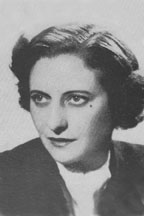 In closing this chapter, it should be noted that Bernice Judas knew nothing about radio broadcasting when she went to work at WNEW in 1934, but her ambition, instincts and daring earned her a place among broadcasting’s most important programmers, because she often took WNEW places before there were any road maps available on how to get there. More about that, another day.
In closing this chapter, it should be noted that Bernice Judas knew nothing about radio broadcasting when she went to work at WNEW in 1934, but her ambition, instincts and daring earned her a place among broadcasting’s most important programmers, because she often took WNEW places before there were any road maps available on how to get there. More about that, another day.
E.B.
* Read selections from Arnie Passman’s book, “The Deejays,” http://www.nytimes.com/books/first/b/brewster-dj.html

